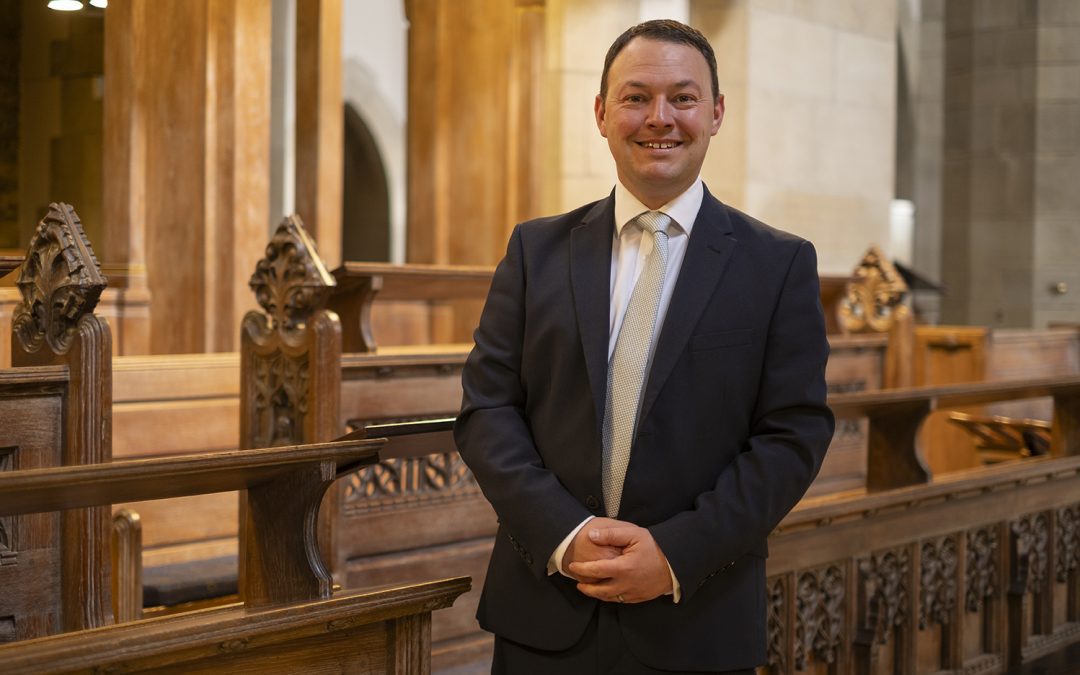On Wednesday 18th September we welcome Edward Taylor from Carlisle Cathedral for the third recital of our 2024 autumn season. In this edition of ‘Notes from an Organist’ we discover more about them, and what to expect from their recital including the importance of outreach work, completing a 12-hour organ marathon, and returning professionally to West Yorkshire.
Could you introduce yourself, how you got into music / become an organist and your musical journey to where you are today?
I began learning the organ whilst a chorister at Ely Cathedral aged 11, having learnt piano and singing with my Grandfather and my mother from 7 years old. This lead to a scholarship at Uppingham school followed by organ scholarships at Portsmouth Cathedral, Leeds Parish Church and Wakefield Cathedral whilst studying for my degree in music. I returned to Ely for my postgraduate studies accompanying the newly formed girls choir before spending the last 16 years as Assistant Organist at Carlisle Cathedral.
What can people expect from your recital at Bradford Cathedral?
I always like to create a programme with variety. Music with good memorable tunes but also something in there to maybe challenge the listener a little or maybe a work that might be played less often. I always aim to bring out the best in the organ through the music.
Why do you enjoy playing the organ?
I love the fact that you can’t take it with you, in other words, every concert you give means learning a new instrument, how it works in the building, where buttons are on the console, what sounds work best on the instrument. An organ’s best features are often its soft sounds but the feeling of playing an organ loudly with the power under your fingertips is fantastic! The memory of playing the organ in Ely Cathedral for the first time will always stay with me.
Do you have a particular favourite piece out of those you are playing?
I enjoy performing and listening to all the pieces on my programme, but the stand out piece for me, the centre piece of the programme, is the 2nd Fantasie-Choral in F sharp minor by Percy Whitlock. I have a particular love for the music of Whitlock. I like the detail in the writing, in particular the attention to articulation and the fact he can write in so many styles, sometimes imitating the music of his dedicatees. This work really shows off the ‘colours’ of any organ its performed on and has beautiful melodies to go with it.
This season’s theme is ‘The Town Hall Organ (Secular and Concert Repertoire)’. How are you reflecting this in your programme?
Apart from the opening ‘Litanies’ by Alain, which is a prayer, the music in the programme is essentially secular. Although I use this music as voluntaries in the cathedral, each piece stands well as a recital piece, with good tunes and interesting variety in styles.
What are your hopes or plans musically for the rest of 2024 and into 2025?
I am looking forward to performing my regular 6 recitals at Carlisle Cathedral in the series there over the course of the next year. I am also exploring plans to return to mainland Europe to perform, as well as expanding my portfolio of recitals in the UK. I am looking forward to continuing the Outreach project into Primary schools over the next year as well as building on successes with my two adult choirs, the Penrith Singers and the Solway Singers
You are the Assistant Organist / Director of the Cathedral Consort at Carlisle Cathedral – how enjoyable have those roles been for you?
The fact I have been in post for 16 years says it all! When I started, I estimated staying in post for 3 years but the job itself, the organ I get to play daily, and its location with the rolling hills of the Lake District said otherwise. The job is always full of variety and challenges to keep you on your toes. I particularly enjoy playing for ‘special’ services, such as the Battle of Britain commemoration, or the Installation of a Bishop for example, especially with the cathedral full to the rafters. I have led the Cathedral Consort on two successful international tours, made a CD with them and performed on radio and television, as well as building a large repertoire of regular service music with them.
You were previously an organ scholar at Leeds Parish Church and Wakefield Cathedral – are you looking forward to returning to West Yorkshire for this recital?
I am a regular visitor to West Yorkshire as my wife’s family are from Leeds, however, it is always wonderful to return to the area in a professional capacity.
You studied at the Strasbourg Conservatoire – was that a good experience?
The year in Strasbourg was the highlight of my education! I have always loved France and its culture and music but to be immersed in it for a year was second to none. I was fortunate to study with Parisian organist, Christophe Mantoux alongside other more local specialist organists in the field of Baroque French organ music. I had several lessons a week including improvisation, figured bass, harpsichord but managed to find time to do about six hours practice a day on a variety of French and German organs. Of course, I also found time to sample the local French/German food and beer!
In 2009 you completed a 12-hour organ marathon. How much of a challenge was that?
It was certainly challenging but great fun! The first three hours were undertaken behind closed doors, from 5am to 8am, to allow for the evening service to take place. The rest were advertised to the public who could stay for as long or as short a time as they liked. I devised 12 1 hour programmes of music, each with a different theme, for example ‘French romantic’ or ‘German Baroque’. The highlight of the day was the hour to commemorate ‘armed forces day’. I performed a number of works suitable for the occasion, attended by members of all the different local armed forces, culminating in the singing of ‘Land of Hope and Glory’, which raised the roof! The marathon raised in the region of £1000 towards the cathedral consort tour to France which was a fabulous result, even if my fingers ached for a week afterwards!
You are also a Choral Director – what have been some of your favourite works that you’ve directed?
I have certainly directed a great variety of works, particularly with my adult choirs ranging from Zimbe and Ahoy by Alexandre L’estrange to Haydn’s Creation with full orchestra and Handel’s Messiah cover to cover, also with orchestra. There has been a lot of Rutter in there including his Psalmfest which was particularly enjoyable. I am currently rehearsing for performances of Agincourt by George Dyson which I have arranged for the same forces as Jenkins’ Armed Man chamber version which partners it in concert. I am directing Bach’s Christmas Oratorio in December.
You do a lot of outreach work with children and schools – why is that important to do?
I believe that music can aid children in all parts of their education from maths to English, reading, languages etc. Not only that but build their teamwork and their self-esteem and confidence. I enjoy having this other side to my musical life. At Carlisle I work with three different primary schools a term, culminating in two concert performances alongside my children’s choir, Carlisle Cantate, in the cathedral. The repertoire is musicals, Jazz, pop and children’s classical. I get a real buzz directing up to 175 children accompanied by myself on keyboard with the cathedral organ acts as the orchestra, thundering in the background in music from the likes of Grease, Oliver, Les Misérables, Mary Poppins to name but a few.
You say on your YouTube channel that you like to promote some lesser-known repertoire. Why is that close to your heart?
Although my repertoire covers much of the regular works that organists play, I was fascinated to see what else was out there. The answer is a lot! And a lot of it is worth playing as well! This music, such as the music of Rowley, Hollins, Wolstenhome and many many others seemed to go out of fashion half way through last century. My aim has been to bring this music back into the limelight which I have tried to do through my You tube channel. There is of course plenty of well known stuff on there as well. I am delighted at the positive responses I have received from listeners and the fact that some of them are now playing this music.
You also played on a CD release ‘Fantasy On Carlisle’ – how did you pick the programme for that compilation?
Picking music for a CD is a tricky one as you want to balance out what you as the individual wants to play along with what the audience want to hear. Sometimes, you can put quite unknown works on the CD as long as there is a work there that stands out to the buyer, which leads to purchase the CD in the end. I had many discussions with Neil Collier at Priory records about the repertoire. In the end, he chose a couple of works he wanted to put on the CD, the lesser known three pieces by Frank Bridge from 1937 as a way to promote them, and an arrangement of ‘For the Phoebe’ by Whitlock as a crowd entertainer. I chose a work by local composer Adrian Self which gives it name to the CD, and a fabulous Prelude and Fugue by David Briggs. The other works on the CD show off the capabilities of the wonderful Willis, H and H, Walker organ in the cathedral at Carlisle.
Finally, how would you sum up your upcoming recital at Bradford Cathedral?
A tuneful varied programme with moments of excitement and relaxation
You can join us on Wednesday 18th September at 1pm to hear Edward’s organ recital, with an optional £4 buffet lunch beforehand at 12:30pm. You can find out more about Edward on his website, Instagram page, or on YouTube.
You can discover more about our organ recital season on our dedicated page.

